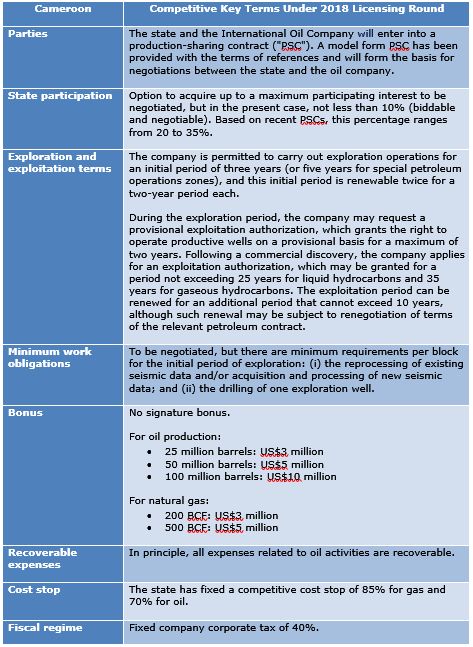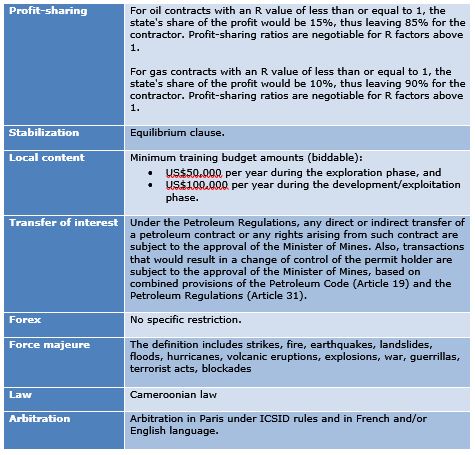In Short
The Situation: Cameroon has announced a bidding process pertaining to licensing rights for oil and gas blocks located in the Rio del Rey and Douala/Kribi-Campo Basins.
The Development: The oil and gas rights include a number of significant incentives designed to attract the interest of international oil and gas companies.
Looking Ahead: Bids are due June 29, 2018, and results will be announced July 18, 2018.
On January 10, 2018, the Société Nationale des Hydrocarbures ("SNH") launched a fresh licensing round for eight blocks through which international oil and gas companies were invited to submit bids in accordance with new competitive terms of reference ("2018 Licensing Round").
Eight Offshore Blocks
The 2018 Licensing Round is bolstered with improved commercial terms relating to eight offshore blocks: three in the hydrocarbon-rich Rio del Rey ("RDR") Basin and five in the prospective Douala/Kribi-Campo ("DKC") Basin.
Arbitration in Paris under ICSID rules and in French and/or English language.


Prequalification of Bids
The bid should be submitted by an oil company, or by a group of commercial companies amongst which, at least one is an oil company with relevant financial and technical capabilities demonstrated by the documentation required under the terms of reference.
In case the bid is submitted by a consortium of companies with only one of them being an oil company, the said oil company should own the majority of interest shares in the consortium, and should act as operator. Otherwise, the oil companies in the consortium shall determine which amongst them shall act as operator.
Timeline
- January 15th, 2018 - June 28th, 2018: data access and evaluation by all interested companies;
- June 29th, 2018, 12.00 noon (local time): deadline by which bids could be submitted;
- June 29th, 2018, 1.00 pm. (local time): public opening of bids in the presence of all bidding companies or their representatives;
- July 18th, 2018: notification of results.
Cameroon's Legal Framework
The Cameroonian upstream sector is governed primarily by Law No. 99/013 of December 22, 1999, instituting the Petroleum Code, and Decree No. 2000/465 of June 30, 2000, setting forth the terms of application for the Petroleum Code. The key institutions involved in regulating the upstream oil and gas sector are the government (through the Minister of Mines) and the SNH. The Minister of Mines is responsible for granting all applicable licenses and authorizations in the sector, regulating petroleum operations, and granting consents for the transfer of licenses or authorizations. The SNH was created in 1980 and is the state body in charge of developing and monitoring petroleum activities for the entire Cameroonian territory, managing the Cameroonian state's interests in the oil sector and controlling the sale of locally produced crude oil in the domestic and international markets.
In order to carry out petroleum exploration and exploitation activities, the Cameroonian state can enter into either a PSC, a concession contract, or a risk services contract. All recent petroleum contract awards have been made pursuant to PSCs rather than concession contracts. A model form PSC has been issued and forms the basis for negotiations with contractors, but there is no model form concession contract.
Cameroon is signatory to the Extractive Industries Transparency Initiative ("EITI") and has set up a multi-stakeholder group, the "Follow-Up Committee," under the leadership of the Minister of Finances, with the responsibility, implementation, and follow-up of the EITI. Cameroon is also a member of the African Petroleum Producers Association.
Three Key Takeaways
- The oil and gas arrangements, including exploration and exploitation terms, have been heavily incentivized to generate investor interest.
- Institutions involved in the regulation of the upstream oil and gas sector include the Cameroon government, through the Minister of Mines, and the Société Nationale des Hydrocarbures.
- Information for prospective bidders is available through June 28, 2018, with bids due by noon (local time) the following day.
The content of this article is intended to provide a general guide to the subject matter. Specialist advice should be sought about your specific circumstances.



